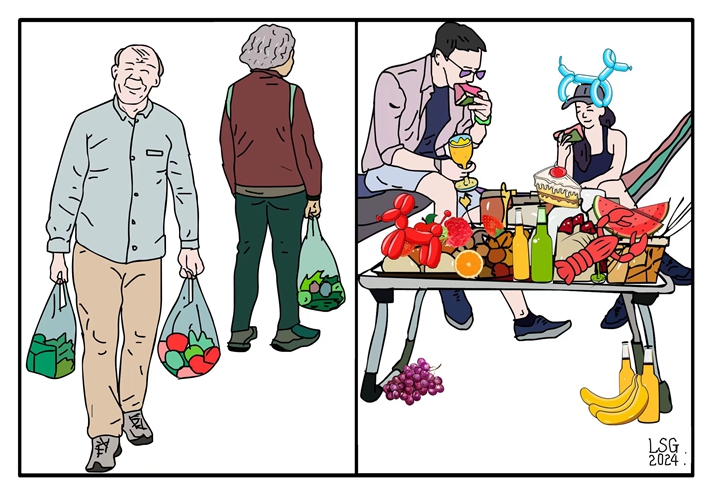| China |
| Happiness vs. Hardship | |
|
|
 Recently, meikuyingchi, a saying describing the older generation's choice to endure unnecessary hardship, and meifuyingxiang, which describes the younger generation trying their best to enjoy life and have fun despite their limited resources, have generated widespread discussion online. For example, while some senior citizens might walk 3 km to the nearest bus stop and risk heat stroke to save a taxi fare, some young people, who earn a low salary, might enjoy the feeling of splurging on fruit they've never tasted before, despite it being sold at a high price. Of course, the two groups have the freedom to choose their desired way of life, but most people believe it's better not to go too far in their respective direction. Otherwise, the old might ruin their health and the young might find it hard to make ends meet. Dai Xinyao (www.rednet.cn): Some old people's thinking has been shaped by enduring hard times when they were young, and now they prefer to live a hard and frugal life, and even see this as a virtue. Their insistence on embracing hardship originates from a false belief that they can only feel a sense of personal value by going through hardship. Everyone has their unique worth and this worth can be achieved by various ways, rather than only by enduring unnecessary hardship. When time and energy are put into meaningless struggles in self-sought hardship, what really matters or should be pursued might be missed. People should spend time on more valuable things, instead of indefinitely self-sabotaging through unnecessary hardship and believing that this is how life should be spent. Although hardship can help forge fortitude in people, to deliberately live a hard life might cause complete exhaustion and even result in the loss of faith in life. We should view hardship in an objective way, neither seeking to avoid it nor blindly pursing it. Qing Ping (Beijing Youth Daily): Different experiences of growing up have resulted in two attitudes toward life. The older generation experienced hard times with limited supplies of food and other essential goods, so they have developed an ingrained habit of saving every coin if possible. Their sense of security comes from their bank savings. Their belief is "no cross, no crown." The younger generation, born in an era when people live well-off lives, believes that there is no need to choose to suffer in daily life, so they usually spend money as they like. The frugality and diligence of older generations have contributed a lot to today's happy life. However, these two virtues shouldn't be taken too far or they might backfire. If older people avoid seeking treatment for illnesses in order to save money, it may eventually cost them more money when they need to be hospitalized. Young people's rejection of living like the older generation is not necessarily a denial of the importance of diligence and frugality, and may merely be a desire to make life more comfortable. The fast-paced modern life is making them exhausted, and meifuyingxiang is just a way of temporarily shielding themselves from hardship in the real life. Of course, if in order to enjoy life, some may overspend or even take out loans online, spending beyond their means. This kind of meifuyingxiang is unacceptable. Whichever way of life they choose, the key is not to go too far. Older people who choose to endure unnecessary hardship possibly don't suffer as much as others may in doing so, instead extracting a sense of dignity from their diligence. It may only be in the eyes of younger people that senior citizens are choosing to suffer. Both groups should probably moderate their behaviors a little. The old should treat themselves better and the young should learn to endure some hardship. Copyedited by G.P. Wilson Comments to yanwei@cicgamericas.com |
|
||||||||||||||||||||||||||||||
|